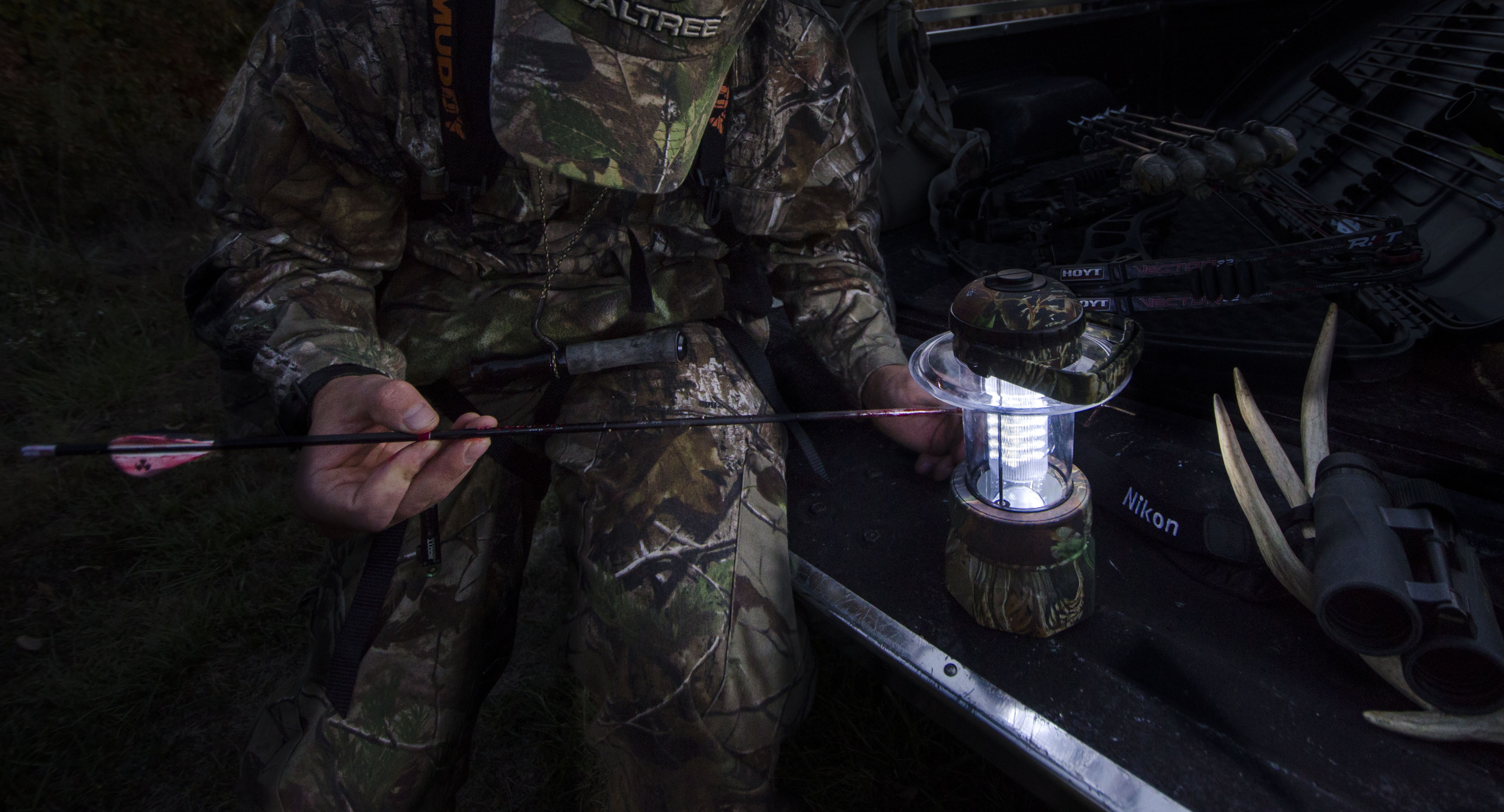The moment you have been waiting for all season is closing the distance. Attempting to calm your nerves, you settle your pin directly behind the shoulder and SHWAACK! The arrow plunges through the animal and emotions are running at an all-time high. After several minutes of personal fist pumping and phone calls to your buddies saying, “I got him! I just shot a giant!”, you finally settle down. Thirty minutes later you climb down out of the stand and what you do next can be the difference between that ‘story book ending’ or the dreaded ‘one that got away’. It is your duty as an ethical hunter to do everything in your power to find that animal and it starts by meticulously analyzing the scene of the shot.
 The sniff test is one way to check your arrow if you suspect you hit too far back.
The sniff test is one way to check your arrow if you suspect you hit too far back.
Everyone has seen it done in some hunting show, following the shot they head back to the lodge and gather around a 50”+ HDTV. Here they analyze the shot placement before making the decision on whether to pursue the animal or give it some time to expire. Man, what a great luxury. However, the fact of the matter is the overwhelming majority do not have the luxury of reviewing video following their shot. Most of the time emotions are still running high and you want to lay your hands on that animal A.S.A.P., thus, leading to foolish decisions. I have been on both ends of this decision-making process, which lead to unfound game and plenty of sleepless nights. Trust me, if you hunt long enough, inevitably you will too. Since then I have learned from my mistakes and have become a better hunter for doing so, and it all starts with analyzing the bloodied arrow or first specs of blood.
Scenario 1: Bright Red/Pinkish Blood with Bubbles
You have landed a pass-through shot and the arrow is covered in bright red blood and even a few blood bubbles are laying on a nearby leaf. This is exactly what you want to see after every shot, aside from actually seeing the buck fall. Bright red blood almost always indicates a shot to the vitals (lungs or heart). Chances are he didn’t make it too far. If this is the case, you are usually safe to track the animal 30 minutes after the shot and it should be dead upon arrival. Great shot!
One word of caution, there is still the possibility that you hit only one lung, in which case they can run a LONG way. I remember a hunt I had in Northern Wisconsin that is still today the most memorable track job of my hunting career. This was back in the days of the jumbo aluminum arrows and slower bow speeds. The image of the buck turning and running through the tightly spaced poplars with the pinging of the 20”+ inches of aluminum shaft bouncing off every tree still remains vivid as ever. I had caught part of the shoulder, which limited the penetration to one lung at most.
So, what did I do? Knowing there was very little penetration, we went back to the cabin, cooked up some dinner and headed back into the timber 3 hours later. After tracking solid bright red blood for ¾ of a mile through the thick nasty, we finally found the mature 8 point in his final resting place with all 3 inches of the arrow still in him. There were no signs of bumping him or beds along the way, he was simply hell-bent on getting as far as he could on one lung. Moral of the story is if you suspect a single lung hit based upon shot angle or observance of little penetration, give the animal at least 3 hours to expire.
Scenario 2: Dark Red Blood
Evidence at the shot site depicts an arrow laden with dark red blood. Chances are if you saw your arrow enter the deer, you knew the shot could have been better. Certainly, not all hope is lost, you just have to have a more methodical approach. This is likely still a lethal shot, but will require agonizing patience on your part. Dark blood is a strong indicator of a liver or venal shot. With these dark red results, it is best to wait a minimum of 3 hours before pursuing the wounded animal. Usually, this is enough time for the animal to bed down and expire. To play it safe I would advise waiting until the following morning if weather conditions permit.
 Here’s an example of a shoulder hit blood trail. Notice the dark blood coming from non-organ wound.
Here’s an example of a shoulder hit blood trail. Notice the dark blood coming from non-organ wound.
Recently, a buddy called me after he just shot a whopper of a buck. He described his shot as being a bit far back and the arrow was covered in dark blood. Immediately, I thought liver shot. I remember saying to him that the buck was going to die, he just needed to give him some time.
Apparently, our understanding of ‘some time’ differed. He called me back two hours later telling me the news that no hunter wants to hear, “I just jumped him from his bed”. My head dropped while on the phone with him, feeling helpless as I was 6 hours away. He went on to tell me he trailed it for about 125 yards before he saw it stand up and wobble a bit before making his escape. The fact that it wobbled told me the buck was very close to dying and with another hour of waiting on my buddy’s part, he would have been able to wrap a tag around him right then and there. Nonetheless, the buck was still alive and it was his duty to find him.
We discussed the situation and decided he should wait for the following morning to continue the search. I had no doubt that the buck was dead, but finding him may be near impossible if the blood had clotted while he was bedded. Knowing my buddy, I knew he would give every ounce of effort to find this buck and he did. However, it was not from following a blood trail, but rather searching the area tirelessly until he found it lying on the creek bank. An extra hour of waiting would have saved him from the emotional rollercoaster, nonetheless his search efforts were rewarded for being an ethical hunter.
Scenario 3: Green Slime
Thump! The arrow hit center mass and you are almost as sick to your stomach as that deer is going to be. You climb down and just as you thought, the arrow reveals a dark green and brown slime with a gut-wrenching stench. Yep, you guessed it, the arrow sliced through some part of the digestive tract. There is likely to be some blood as well, but these shots result in some of the toughest tracking missions of all. If weather conditions allow wait at least 7 hours or until the following morning to pursue. A daunting task lies ahead, but if you allow time for the deer to expire before tracking, the odds of recovery increase significantly.
The waiting game is extremely tough, especially if rain is on its way. Since so many of us hit the woods hard before a major front this is often a challenge you will undoubtedly have to face at some point in your hunting career. I was rudely reminded of this ‘should I stay or should I go’ decision at the ripe young age of 15 when I took a sharp quartering away shot on a young forker I had grunted in. After being picked up by my mother following the hunt (isn’t that what mothers are for?) I remember the raindrops hitting the windshield and thinking I need to go look now! So, I got home, called my buddy who could drive and we set out after it. Well, we ended up jumping it not 70 yards from where I shot. Of course, we backed out, but were left second guessing ourselves. Luckily using the grid search method and my uncle’s tall height, we recovered that buck the next morning in a CRP field. Now grown up and having had many tracking missions under my belt, I’m still not sure I can give a good answer as to whether or not you should pursue a marginally hit animal if unfortunate weather is on its way. I do however, know exactly what I would do if the forecast remained favorable or if there was snow on the ground and the answer is WAIT!
 This arrow broke off and the other half of the arrow was still in the deer. By comparing it to another arrow in my quiver we were able to determine how much penetration there was.
This arrow broke off and the other half of the arrow was still in the deer. By comparing it to another arrow in my quiver we were able to determine how much penetration there was.
We Owe it to the Sport
Obviously, these are not the only 3 situations that are possible, but they are a good representation of most shots. You know as well as I do that some strange and unexplainable things can happen during the shot and recovery. Almost every lethal shot will have some sort of blood sign to analyze and make the appropriate tracking decision.
RELATED: Is there really a “No Man’s Zone” in Deer?
We owe it to ourselves and ancestors as participants of the hunting heritage to tirelessly seek any wounded game. Perhaps the aforementioned scenarios were the reasons our Native American ancestors were phenomenal trackers. Surely, they had many marginal hits simply due to the equipment they were using. Pass through shots were near non-existent, but they understood the animal and the difference of recovering or not recovering could have been life or death.
Nowadays, we are fortunate to be using phenomenal equipment. Ultra-fast bows and razor sharp broadheads should be: Advantage Hunter…But if a lazy, unethical approach to game recovery slips between us and our game, the sport of hunting is tarnished. For this reason, I choose to use lighted nocks and white fletchings. An illuminated nock helps you see the point of impact and the white fletchings on the arrow displays the content of the shot – bright red and bubbly means go, dark red or a nasty slime means wait. Both are great and inexpensive options to add to your arsenal, which will benefit not only the sport of hunting, but your trophy room as well.







